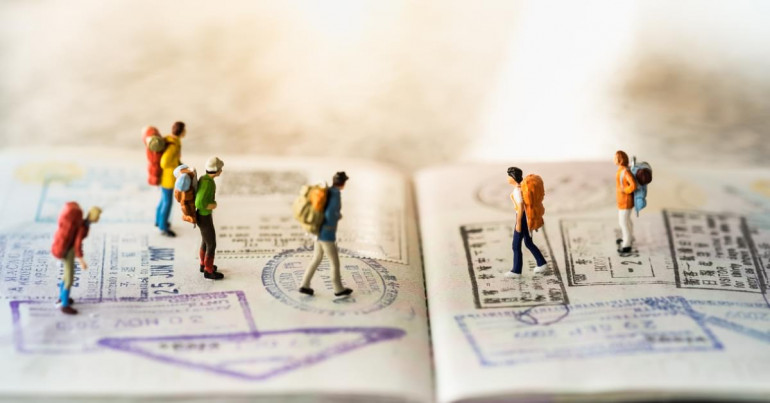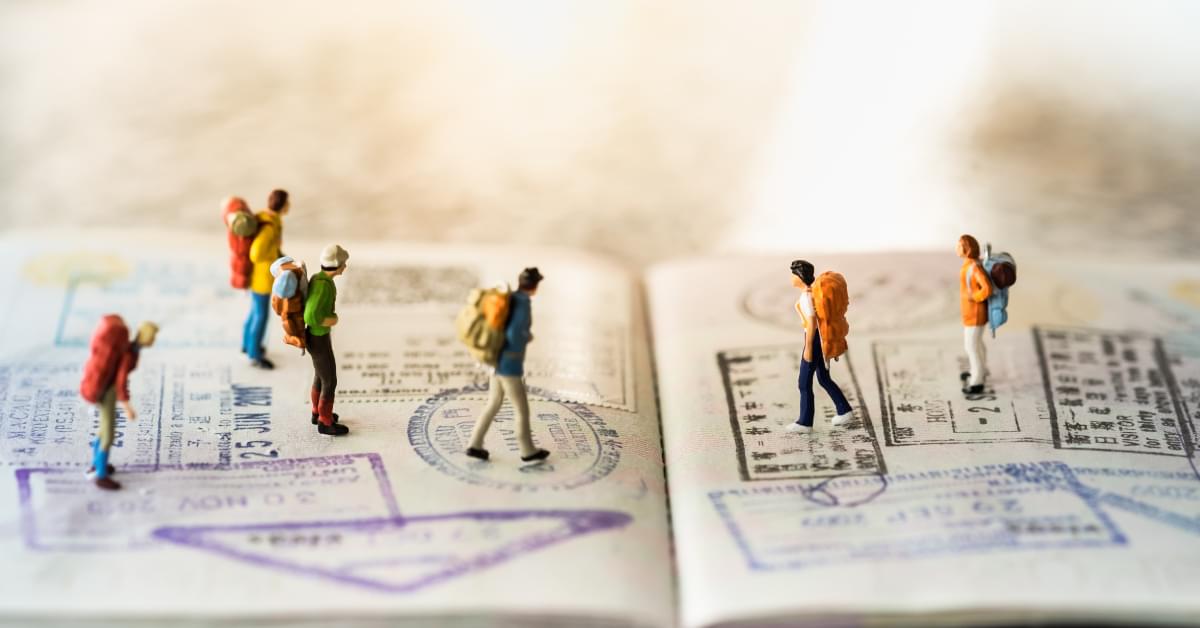
Owing to the difficulty of obtaining EU Settled Status, expats have been returning to the UK in growing numbers. But it’s not the only factor contributing to high rates of repatriation – social studies show that despite improved communication technologies, the novelty of expatriate living doesn’t surmount the disconnect many feel between themselves and family in the UK.
If you’re an expat planning on coming back to the UK, it can be a confusing and challenging prospect without the right guidance.
Below, we’ve answered some of the most common questions asked by returning UK citizens and have also addressed some of the country-specific concerns of those coming back from EU territories.

A checklist for returning UK citizens
The issues faced by British citizens returning to the UK are almost too long to list. If you’ve already begun planning for your return, no doubt you are aware of more basic actions you may have to take.
Below, we’ve created a checklist of concerns you may have overlooked. Not all may apply to you, but if they do, ensuring you’ve covered your bases will make your return trip a little bit less stressful.
For a more general list of actions you must take before repatriating, make sure to refer to official government guidance for returning UK citizens.
Professional qualifications
For those employed in professions such as nurses, teachers, accountants and electricians, it’s vital to ensure you approach the appropriate regulator for your profession in the UK.
You might also need to ensure your professional qualifications are recognised if you intend to practise in a regulated profession in the UK.
You can view a full list of regulated professions in the UK here.
Check whether you’re eligible for benefits
Depending on how long you’ve been living abroad, you may find that you are now eligible for certain benefits that you did not previously qualify for on your return to the UK.
These include pension credit, housing benefits or council tax reduction. Most UK benefits are means-tested, taking into account income and savings.
If you earn significantly more or less than you did when you emigrated from the UK, be sure to see how you now qualify.
Browse the official UK government guidance for benefits to learn more.
Double-check UK regulations on medication
If you’ve already registered with a local GP practice, consider calling them and enquiring about the regulations on any medication you may take.
The UK regulates some medications more strictly than other countries. You may have to be referred to a specialist to continue receiving your prescription in the UK.
Some waiting lists are longer than others – you might have to wait as long as 9 months for an appointment in some cases.
So make sure to stock up on your medication before returning, or plan well in advance to prevent any inconvenience.
Build up your credit history
If you’ve been away for a long time, your credit score will likely have degraded, making it difficult to secure credit agreements.
A business might review your credit score when purchasing mobile phones, applying for a mortgage, or renting a property.
Several online tools will allow you to check your credit history without negatively affecting your score.
If your credit score doesn’t look great, there are a few handy ways you can quickly boost your score, given that you’ve kept your bank accounts active during your time away.
Transporting pets
Animal importation rules are straightforward, but you’ll still want to use a specialist transportation company to ensure all required documentation is in place to avoid unnecessary delays.
You can enter the UK with your pet if:
- Your pet is microchipped
- You have obtained an official veterinary certificate
- Your pet is vaccinated against rabies
- You have clear blood test results (if travelling from an unlisted country)
- Your dog has had recent tapeworm treatment.
It’s also worth researching the airline you plan to travel with and seeing if they have any special requirements regarding pet transportation. Bear in mind that not all UK airports accept animals, and the costs can vary.

UK emigration and tax regulations
Tax concerns are usually the primary concern for most UK repatriates. Taxes are complicated, and it’s easy to be blindsided by unexpected tax liabilities. It’s essential to seek professional financial advice before your move. Below are a few loopholes and important points to remember when moving back to the UK.
UK Income Tax advice
If either you or your partner is not of British descent or has become non-domiciled for UK tax purposes, you can avoid certain UK taxes.
This can allow you to shelter non-UK gains from Income Tax and Inheritance Tax. There are some caveats however, and it’s important to plan correctly.
Consider closing any non-UK deposit and savings accounts you have opened. This way, the interest pays on your offshore bank accounts before you return. Any interest accumulated will become taxable in the UK if you don’t.
Selling property abroad and locally
If you own property in the UK and don’t plan on living in your house when you return, you may want to consider selling while you are still non-resident. Doing so can help you avoid sizable Capital Gains Taxes (CGT).
If you decide to sell your house after your return, expect to pay a large sum in CGT.
Alternatively, you can transfer your property into a short-term trust during the tax year before your return. If you do so, taxes will not be applied to any gains realised. The trust can then acquire the property at market value.
If you sell after having the property returned to you, the HMRC will calculate its cost for tax purposes at the value you received from the trust. This is a good option for those who want to hold on to a property that rents well temporarily.
Understanding tax residence status in the UK
You will need to use the Statutory Residence Test to determine your UK tax status . Be careful not to spend too much time in the UK while preparing to move and accidentally change your tax residence status.
- If you have lived abroad for fewer than 3 years, just 16 days in the UK may make you considered a UK tax resident.
- If you have lived outside the UK for longer than 3 years, spending 46 consecutive days in the UK will classify you as a tax resident (30 days if you spend your stay in an owned property).
Split year tax treatment
The UK tax year runs from April to March. Most other countries have different tax years.
If you plan to return to the UK mid tax year, split-year treatment could apply to you – if you qualify, you would only be liable for UK tax from the moment you return, rather than for the whole tax year (even if you become a tax resident in that year).

Special provisions when returning to the UK
It’s always important to refer to local emigration advice when permanently changing your country of residence to the UK. Each country has its own laws regarding a permanent change of address. Be sure to do your research and avoid any penalties, fines and unwelcome delays when moving.
Steps to take when returning to the UK from France
- Tell the French and UK authorities you are returning to the UK permanently.
- Inform your local French tax office of your change of address and the date you will leave.
- If you receive unemployment, child or housing benefits, you must inform your local social security office of your departure.
- Ensure returning non-British family members apply for immigration status.
Steps to take when returning to the UK from Spain
- Tell the relevant UK and Spanish authorities you are returning to the UK.
- To prove your intent to migrate to the UK permanently, you must deregister with:
- Your local town hall or municipality in Spain
- The Spanish National Police
- Your local Spanish health centre
- If you get healthcare in Spain through the S1 form, you must contact the Seguridad Social to make sure your S1 is cancelled.
- To move your pension to the UK, inquire with the International Pension Centre and the Instituto Nacional de la Seguridad Social.
Steps to take when returning to the UK from Germany
- Tell the German and UK authorities you are returning to the UK permanently.
- If you receive a German pension, contact both the International Pension Centre and pension services in Germany
- To prove your intent to migrate to the UK permanently, you must deregister with:
- Your local registration office, or Einwohnermeldeamt
- Your local health insurance provider and hospitals
- Any local service providers and banks.
Steps to take when returning to the UK from the Netherlands
- Before you leave the Netherlands, you must deregister from the Personal Records Database (BRP). You do not have to report your departure to the Immigration and Naturalisation Service (IND).
- Return your residence document to the IND. This remains the property of the Dutch Government (be sure to invalidate the residence document by damaging it).
- Make sure to leave the Netherlands before the expiry date of your current residence permit. If you fail to do so, you may face legal action.
Steps to take when returning to the UK from Poland
- Tell the Polish and UK authorities you are returning to the UK permanently.
- To move your pension to the UK, contact the International Pension Centre.
- If you get healthcare in Poland through the S1 form, you must ensure your S1 is cancelled at the right time.
Steps to take when returning to the UK from Denmark
- Report that you are leaving to the Civil Registration System (CPR). You can do this by submitting the relevant documents to your local municipality.
- Forward your mail through the Danish postal service to your new address. You can do this online for the first 6 months.
- Hand in your national health insurance card at your local Citizen Service centre or destroy it.
- Read your gas and electricity metres before you move and inform your energy provider. Otherwise, you risk being held responsible for the cost of utilities until the next resident registers as a consumer.
- Once you have deregistered from the Danish National Register, call the Danish Tax Agency to determine your tax liability. You will need to submit specific documents to the Tax Agency when leaving Denmark.
- If you own a vehicle, you must surrender your licence plates to the Customs Office and notify the Central Motor Registry Office. If you take your car with you, you are entitled to a refund on part of the paid registration duty.
International money transfers
You will need to have a bank account in the UK if you want to transfer any funds from abroad. Unpredictable swings in currency markets can upset even the most diligently planned journeys.
If you use CurrencyTransfer to manage the exchange of your offshore funds, you can lock in an exchange rate for up to 12 months and secure your money against negative market conditions.
Matthew Swaile
Copywriter
Florence Couëdel
Editor



